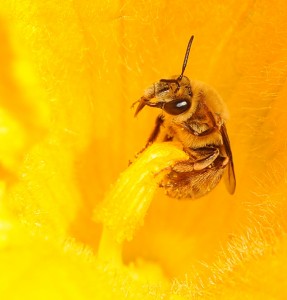The Thanksgiving meal, with it’s heaps of buttery mashed potatoes, succulent piles of turkey, and gelatinous gobs of cranberry sauce, is truly an All-American feast in more ways than one. Most of the foods we mound onto our plates originated in the Americas. What’s more, many of them rely on pollinator partners that are also native to the New World.
While most of us think of the iconic honey bee as the primary pollinator of our food crops, they were introduced to the Americas from Europe. Before that, a variety of native bees were responsible for all crop pollination. The dishes shared by the pilgrims at the first Thanksgiving dinner likely owe a debt of gratitude to the native bees of New England.
Take pumpkins, the key ingredient in my favorite pie, for example. To fatten into their delicious orange form, pumpkins need to be visited by a specific pollinator, the squash bee, Peoponapis purinosa, which is found throughout much of North America.
Pumpkins have large, yellow, tubular flowers that open at dawn. At the base of the female reproductive organ, are tantalizing pools of nectar. Female squash bees also wake at first light to plunder these rich resources, climbing deep into the flower’s gullet. In the process, thousands of pollen grains adhere to the russet-colored velvety hairs that cover the bees’ bodies. While the bees carry some of the pollen home to their nests, they inadvertently deposit the rest in other pumpkin flowers as they forage between different plants.
Native bees come in all shapes and sizes, which makes them suitable pollinators for an array of tasty crops. Even today they contribute to a wide variety food production, including apples, almonds, peaches, pears, cranberries, and, yes, even pumpkins.
This Thanksgiving, I plan to give thanks to a group of insects that made my delicious meal possible: the native bees. Which bugs will you be thanking?
~ Hillary Sardiñas, pollination ecologist
Kremen lab ESPM

